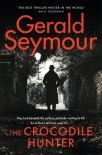The Crocodile Hunter by Gerald Seymour (english novels to improve english txt) 📗

- Author: Gerald Seymour
Book online «The Crocodile Hunter by Gerald Seymour (english novels to improve english txt) 📗». Author Gerald Seymour
And money? Was there money for Cammy? A little laugh, almost a snigger . . . and more advice given him in Bordeaux, and the phones, but again a gesture of helplessness when quizzed for money, and a suggestion. “The Iranians are best, go for the Iranians, they have money.” He had fought Iranians.
Had fought Iranians and Hezbollah boys, Syrian troops and the paramilitary fighters in régime uniform, and Russians; and there were times when they had been in combat against Special Forces, might have been British or might have been American. Cammy had fought against the world, was unconcerned about the politics of who he supported or who he opposed. All of them were the same. And good at what they did . . . a team of brothers. Stanislau, a rifleman, but devastating in movement when clearing a building or a bunker; Tomas, who understood the trajectory of the 81mm mortar bomb when it was launched, and the wind factors, and could have three in the air before the first landed; Mikki, who did explosives and could make crude pressure-plate booby traps and could defuse them; and Pieter who was the sniper and Dwayne who had twice expertly flown Russian-made drones captured from Syrian paratroopers and had put one into the broken window of a defended farmhouse and with a modification that dumped two activated hand grenades; and Ulrike, who was the mother to them, who patched wounds and fortified their morale and who fed a machine-gun belt. He, Kami al-Britani, would be on the big weapon, the 50-calibre with ferocious hitting power. They were all survivors. Had wounds and she stitched them, had foot rot and gut rot and she seemed able to rustle the necessary antidotes, had once sucked out a snake venom implanted in Tomas’s leg. Because she was one of them, she also was a brother. Their own emir, Ruhan, was jealous for them and rationed their deployment to other units. They hit hard, came back together, showed no fear, were in love with the danger, always close and supporting each other. Cammy had heard the phrase “one for all and all for one” and thought it made for them . . . Now he was alone.
He strained to see better. A shower came in from the south, from above Dunkirk and it would reach where he sat within half an hour. When the shower came, visibility would be lost.
For a few minutes more the sunshine played on the water and caught the brilliance of the white foam and he spotted a tanker on its way north, the light revealing the enormity of its superstructure. But he did not look at the water nor at the shipping, but concentrated on the horizon and was unsure what he saw.
There might have been, between the sealine and the darkening clouds, a smear of shadow. There would not have been white cliffs, but a part of the coast where the sea met shingle beaches, where he had been on school trips.
Might have been just a shadow to show him where the gulls had come to lift cold chips from polystyrene trays, where ice-creams had been sold, and where pretty beach huts lined an esplanade, and where there were bus-stops that displayed the timetables of the service to Canterbury . . . He was unsure if he could see the shadow and it hurt his eyes to gaze into the distance with that intensity. He had flown over where he thought the shadow was, and had finally reached Vienna. From Vienna there had been the road link to Istanbul, and then buses and hitch-hiking, and a man in a café had gone with him under cover of darkness and shown him where he could lift a fence and get down on his hands and knees and crawl under it and pull his rucksack after him. Had not looked back, not at any stage. Had not considered whether he left indifference or hurt behind him.
The wind had altered, came in a surge from the north and the sand flew up and worked its way between the grass stems and blistered against his eyes. He thought, then, that he saw the shadow of land in the long distance. Might have and might not, but wanted to believe he had seen the pencil-thin strip, but his eyes hurt too much for him to look again. The wind’s change altered the pitch of the waves and he thought the white caps wider and more persistent.
He pushed himself up, then took the plastic bag with the bread





Comments (0)